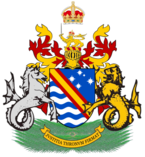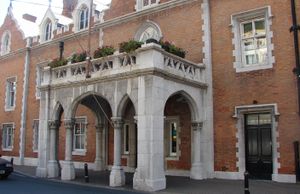Prime Minister of Ibagli
 This article is a part of the Politics and Government of Ibagli series. |
| Executive |
|---|
|
Monarch (King Charles III) |
| Legislative (Parliament) |
|
House of Commons (Speaker) |
| Judicial |
|
Supreme Court (Chief Justice) |
The Prime Minister of Ibagli is the head of government of Ibagli. The office is not officially outlined in any of Ibagli's constitutional documents, but is based on constitutional convention.
The Prime Minister is appointed by the Governor-General, who typically appoints the leader of the political party or coalition that holds the greatest number of seats in the House of Commons.
The current Prime Minister is Andrew Spearman, who was appointed on 1 June 2023 after being elected leader of the Liberal Party.
Qualifications and Selection
The Prime Minister is formally appointed by the Governor-General on behalf of the Sovereign. Constitutional convention, however, requires that the Governor-General appoint the leader of the party or coalition with the most seats in the House of Commons in order to maintain a stable government.
The Prime Minister may be any Ibaglian or Commonwealth citizen of voting age (18 years). It is also a constitutional convention that the Prime Minister be a member of the House of Commons. In the event that the leader of a victorious party does not win a seat in the House, it was until 2006 customary for a junior MP in a 'safe' seat to resign and permit the leader of the party to run in the ensuing by-election. With the advent of party-list voting, however, it is unlikely that a party leader will be unable to be elected.
Term
The Prime Minister does not have a fixed term. They are only required to resign if an opposition party wins a majority of the seats in the House of Commons. If the government loses the confidence of the House of Commons, the Prime Minister has two options. He may resign, allowing the Governor-General to appoint a new Prime Minister, or he may request that Parliament be dissolved and a general election be called. It is a constitutional convention that a general election may not be called within six months of another unless it is impossible for any party to govern.
Elections for the House of Commons must be held at most 5 years after the previous one; however, the Prime Minister may ask the Governor-General to call a general election at nearly any time. Usually, when a party has a majority, elections are held 4-5 years after the previous election. With minority governments, votes of no confidence may bring about quick elections or resignations.
The record for the longest-serving Prime Minister is held by John Goodwin, who surpassed Joseph Kenilworth's record of 13 years on 27 November 2009. The shortest serving Prime Minister was Marcus Smallegan.
Role and Authority

The Prime Minister is the head of the Ibaglian government, and is, in practice, the most powerful member of the Ibaglian government.
The office of Prime Minister is mentioned nowhere in the Ibaglian Constitution. Under modern constitutional practice, however, their prerogatives are primarily those given to the Governor-General in the various constitutional documents of Ibagli. The Prime Minister of Ibagli, as do other Commonwealth Prime Ministers, arguably has the most personal and absolute power of any elected leader of any full democracy in the world.
The Prime Minister has de facto control over the following appointments:
- Justices of the Supreme Court of Ibagli
- All Cabinet members, who he may replace at any time
- Vacancies in the Senate
- All ambassadors and high commissioners to foreign states
- The Governor-General of Ibagli